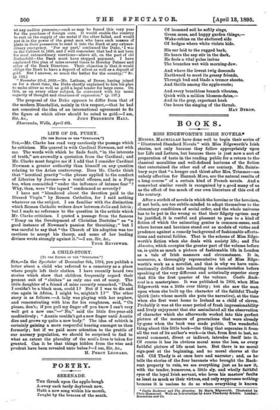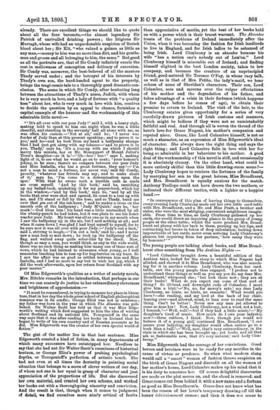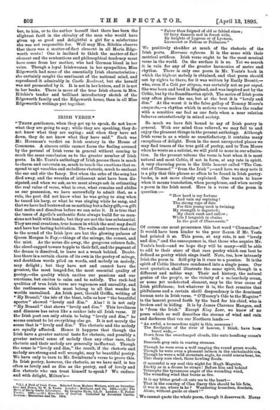BOOKS.
MISS EDGEWORTH'S IRISH NOVELS.* MESSRS. MACMILLAN have done well to begin their series of "Illustrated Standard Novels" with Miss Edgeworth's Irish stories, not only because they follow appropriately upon her Life and Letters, but because there is just now a sort of preparation of taste in the reading public for a return to the- classical moralities and well-defined horizons of the fiction that entertained the other end of our century. Mr. Saints- bury says that "a hunger and thirst after Mrs. Trimmer—an- unholy affection for Hannah More, are the natural results of a long course" of a certain kind of French novels. And a somewhat similar result is recognised by a good many of us as the effect of too mach of our own literature of this end of the century.
After a surfeit of novels in which the heroine or the heroines,. if not both, are too subtle-minded to adapt themselves to the elementary conditions of social order, and the whole universe has to be put in the wrong so that their fidgety egoism may be justified, it is restful and pleasant to pass to a kind of fiction of which the animating genius is common-sense, and. where heroes and heroines stand out as models of virtue and- prudence against a comedy background of fashionable affecta- tions and natural foibles. That is the scheme of Miss Edge- worth's fiction when she deals with society life ; and The Absentee, which occupies the greater part of the volume before us, is quite as much a picture of fashionable life in London as a tale of Irish manners and circumstance. It is, moreover, a thoroughly representative bit of Miss Edge-- worth's work as a novelist, and that is why we have unin- tentionally drifted into indicating its characteristics before speaking of the very different and artistically superior story that fills the first quarter of the volume. Castle Rack-- rent is a masterpiece. It was published in 1800, when Miss Edgeworth was a little over thirty ; but she saw the man upon whom she built up the character of the faithful Thady Quirk (into whose mouth she puts the narrative), at the time when she first went home to Ireland as a child of eleven. Probably it was at the same period of fresh impressionability and lively enjoyment that she assimilated all the observation of character which she afterwards worked into this perfect picture of the manners of generathms that were already by-gone when the book was made public. The wonderful. thing about this little book—the thing that separates it from• all the rest of its author's work—is that, from first to last, no moral comment, direct or indirect, intrudes itself into it.. Of course it has its obvious moral none the less, as every faithful picture of life must have. But there is no moral- sign-post at the beginning, and no moral chores at the end. Old Thady is at once hero and narrator ; and, as he- tells the stories of the four baronets who brought the Rack- rent property to ruin, we see everything just as he saw it, with the tender, humorous, a little sly, and wholly faithful eyes of the loyal Irish servant, who loves his masters' faults as least as much as their virtues, and only suppresses nothing because it is useless to do so when everything is known • Castle Baelerent and The Absentee. By Maria Edgeworth. Illustrated by, Chris Hammond. With as Introduction by Anne Thackeray Ritchie. London
Macmillan and Co.
already. There are excellent things we should like to quote about all the four baronets,—the almost legendary Sir Patrick of unrivalled drinking powers ; the litigious Sir Murtagh, whose wife had an unpardonable suspicion of Scotch blood about her ; Sir Kit, "who valued a guinea as little as any man,—money to him was no more than dirt, and his gentle- man and groom and all belonging to him, the same." But good as all the portraits are, that of Sir Condy infinitely excels the rest in mellowness of conception and delicacy of execution. Sir Condy was, moreover, the best-beloved of all the masters Thady served under ; and the betrayal of his interests by Thady's own son, the hard-headed agent to the property, brings the tragi-comic tale to a thoroughly good dramatic con- clusion. The scene in which Sir Condy, after hesitating long between the attractions of Thady's niece, Judith, with whom he is very much in love, and a lady of fortune with " a quality toss" about her, who is very much in love with him, resolves to decide the question by an appeal to chance, furnishes a capital example of the humour and the workmanship of this admirable little novel :—
"' It's all over with our poor Judy !' said I, with a heavy sigh, making bold to speak to him one night when he was a little cheerful, and standing in the servants' hall all alone with me, as was often his custom.—` Not at all,' said he; I never was fonder of Judy than at this present speaking; and to prove it to you,' said he—and he took from my hand a halfpenny change that I had just got along with my tobacco—' and to prove it to you, Thady,' says he, it's a toss-up with me which I should marry this minute, her or Mr. Moneygawl of Mount Juliet's Town's daughter—so it Oh—boo ! boo !' says I, making light of it, to see what he would go on to next ; your honour's joking, to be sure ; there's no compare between our poor Judy and Miss Isabella, who has a great fortune, they say.'—' I'm not a man to mind a fortune, nor never was,' said Sir Condy, proudly, •whatever her friends may say; and to make short of it,' says he, I'm come to a determination upon the spot.' With that he swore such a terrible oath as made me cross myself. And by this book,' said he, snatching up my ballad-book, mistaking it for my prayer-book, which lay in the window,—`and by this book,' says he, `and by all the books that ever were shut and opened, its come to a toss up with me, and I'll stand or fall by the toss; and so Thady, hand me over that pin out of the ink-horn ; ' and he makes a cross on the smooth side of the halfpenny ; Judy M'Quirk,' says he, her mark.'—God bless him ! his hand was a little unsteadied by all the whisky-punch he had taken, but it was plain to see his heart was for poor Judy. My heart was all as one as in my mouth when I saw the halfpenny up in the air, but I said nothing at all ; and when it came down I was glad I had kept myself to myself, for to be sure now it was all over with poor Judy.—` Judy's out a luck,' said I, striving to laugh.—` I'm out a luck,' said he ; and I never saw a man look so east down ; he took up the halfpenny off the flag, and walked away quite sober-like by the shock. Now, though as easy a man, you would think, as any in the wide world, there was no such thing as making him unsay one of these sort of vows, which he had learned to reverence when young, as I well remember teaching him to toss up for bog-berries on my knee. So I saw the affair was as good as settled between him and Miss Isabella, and I had no more to say but to wish her joy, which I did the week afterwards, upon her return from Scotland with my poor master."
Of Miss Edgeworth's qualities as a writer of society novels, Mrs. Ritchie remarks in the introduction, that perhaps in our time we can scarcely do justice to her extraordinary cleverness and brightness of apprehension :—
"It must be remembered, in trying to measure her place in litera- ture, that in her day the whole great school of English philosophical romance was in its cradle; George Eliot was not in existence ; my father was born in the year in which The Absentee was pub- lished. Sir Walter Scott has told us that it was Miss Edge- worth's writing which first suggested to him the idea of writing about Scotland and its national life. Tourgenieff in the same way says that it was after reading her books on Ireland that he began to write of his own country and of Russian peasants as he did. Miss Edgeworth was the creator of her own special world of fiction."
The gist of the matter lies in that last sentence. Miss Edgeworth created a kind of fiction, in many departments of which many successors have outstripped her. Needless to say that she had not Sir Walter Scott's roominess of historical horizon, or George Eliot's power of probing psychological depths, or Tourgenieff's perfection of artistic touch. She had not even at all times the dexterity in painting social situation that belongs to a score of clever writers of our day, of whom not one is her equal in grasp of character and just appreciation of the proportions of life. But she discovered her own material, and created her own scheme, and worked her books out with a thoroughgoing sincerity and conviction. And the result is that, though when it comes to judgment of detail, we find ourselves more nicely critical of faults than appreciative of merits, yet the best of her books hold us with a power which is their truest warrant. The Absentee treats of the problems of Ireland immediately after the Union, when it was becoming the fashion for Irish landlords to live in England, and for Irish ladies to be ashamed of being Irish. Lord Clonbrony is an absentee because his wife "has a notion one's nobody out of Lon'on." Lord Clonbrony himself is miserable out of Ireland ; and finding himself slighted in the best London society, takes to low company, and becomes the creature of an unprincipled friend, good-natured Sir Terence O'Fay, in whose racy talk, as well as in that of Mrs. Petito, the lady's-maid, we hear echoes of some of Sheridan's characters. Their son, Lord Colambre, sees and mourns over the vulgar affectations of his mother and the degradation of his father, and takes advantage of a crisis in their fortunes (which happens a few days before he comes of age), to obtain their promise to return to Ireland. The visit of the heir, to the Clonbrony estates gives opportunity for a series of very carefully-drawn pictures of Irish customs and manners, which might be tedious if they were not so unmistakably faithful and real. And through all is woven the thread of the hero's love for Grace Nugent, his mother's companion and reputed niece. Grace, like Lord Colambre himself, is not so much a character, as an expression of Miss Edgeworth's ideal of character. She always does the right thing and says the right thing ; and Lord Colambre falls in love with her for being so admirable in her behaviour to his mother. A good deal of the workmanship of this novel is stiff, and occasionally it is absolutely clumsy. On the other hand, what could be more entirely skilful than this little drawing-room scene?— Lady Clonbrony hopes to retrieve the fortunes of the family by marrying her son to the great heiress, Miss Broadhurst, and Mrs. Broadhurst is equally anxious for the match. Anthony Trollope could not have drawn the two mothers, or indicated their different tactics, with a lighter or a happier hand :—
"In consequence of this plan of leaving things to themselves, every evening Lady Clonbrony made out her own little card-table with Mrs. Broadhurst, and a Mr. and Miss Pratt, a brother and sister, who were the most obliging, convenient neighbours imagin- able. From time to time, as Lady Clonbrony gathered up her cards, she would direct an inquiring glance to the group of young people at the other table; whilst the more prudent Mrs. Broad- hurst sat plump with her back to them, pursing up her lips, and contracting her brows in token of deep calculation, looking down impenetrable at her cards, never even noticing Lady Clonbrony's glances, but inquiring from her partner, how many they were by honours ? ' "
The young people are talking about books, and Miss Broad-_ burst cites something from The Arabian Nights :-
"Lord Colambre brought down a beautiful edition of the Arabian tales, looked for the story to which Miss Nugent had alluded, and showed it to Miss Broadhurst, who was also search- ing for it in another volume. Lady Clonbrony, from her card- table, saw the young people thus engaged. I profess not to understand these things so well as you say you do, my dear Mrs. Broadhurst,' whispered she; but look there now ; they are at their books ! What do you expect can come of that sort of thing ? So ill-bred, and downright rude of Colambre, I must give him a laint.'—` No, no, for mercy's sake ! my dear Lady Clonbrony, no hints, no hints, no remarks ! What would you have ?—she reading, and my lord at the back of her chair, leaning over—and allowed, mind, to lean over to read the same thing. Can't be better ! Never saw any man yet allowed to come so near her ! Now, Lady Clonbrony, not a word, not a look, I beseech.'—' Well, well !—but if they had a little music.'—` My daughter's tired of music. How much do I owe your ladyship now?—three rubbers, I think. Now, though you would not
believe it of a young girl,' continued Mrs. Broadhurst, I can assure your ladyship, my daughter would often rather go to a book than a ball.'—' Well, now, that's very extraordinary, in the style in which she has been brought up ; yet books and all that are so fashionable now, that it's very natural,' said Lady Clon- brony."
Miss Edgeworth had the courage of her convictions. Good heroes and heroines were to be ready for any sacrifice in the cause of virtue or prudence. So when what modern slang would call a " smart " woman of fashion throws suspicion on the birth of Grace Nugent and discredit on all the women of her mother's house, Lord Colambre makes up his mind that it is his duty to renounce her. Of course delightful discoveriea are made as the plot moves on, and the cloud is removed, and Grace comes out from behind it with a new name and a fortune as good as Miss Broadhurst's. Grace does not know what has been the reason of her lover's temporary drawing•off till the happy iclairciksement comes : and then it does not occur to
her, to him, or to the author herself that there has been the slightest fault in the chivalry of the man who would have given up so good and delightful a girl for a misfortune she was not responsible for. Well may Mrs. Ritchie observe that there was a matter-of-fact element in all Maria Edge- worth wrote ! One is inclined to think the matter-of-fact element and the sententious and philosophical tendency must have come from her mother, who had German blood in her veins. Though a loyal Irishwoman in her sympathies, Miss Edgeworth had none of the essentially Irish characteristics ; she certainly caught the sentiment of the national mind, and reproduced it admirably in Castle Rackrent, but she herself was not permeated by it. It is not in her letters, and it is not in her books. There is more of the true Irish charm in Mrs. Ritchie's tender and brilliant introductory sketch of the Edgeworth family and the Edgeworth home, than in all Miss Edgeworth's writings put together.




































 Previous page
Previous page